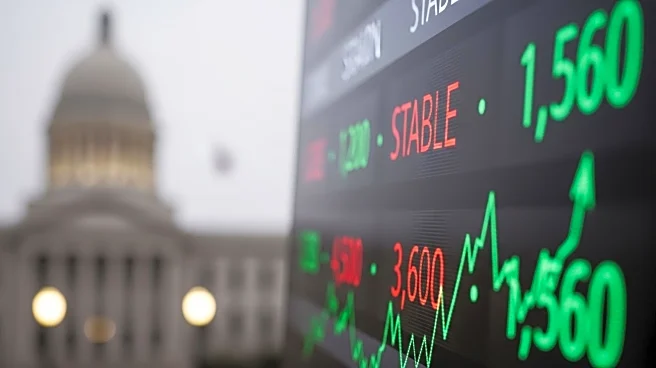What's Happening?
U.S. stock futures maintained stability on Sunday night following a record rally on Wall Street last week, despite the ongoing government shutdown. Futures for the Nasdaq 100, Dow Jones Industrial Average, and S&P 500 Index showed slight increases of 0.11%, 0.19%, and 0.2%, respectively, as of 9:22 p.m. EDT on October 5. The previous Friday saw mixed stock performance, with the Dow Jones climbing 1.10%, the S&P 500 advancing 1.09%, and the Nasdaq 100 adding 1.15%. While all three major indexes reached record highs intraday, only the S&P 500 and Dow Jones closed at new all-time highs, as the Nasdaq's gains were tempered by weaknesses in key tech stocks. Despite the government shutdown, investors appeared to dismiss concerns, as lawmakers failed to reach a funding agreement, resulting in the closure of many offices and the delay of key economic data, including the September jobs report.
Why It's Important?
The stability of U.S. stock futures amid a government shutdown highlights investor confidence in the market's resilience. The shutdown's impact on economic data releases, such as the September jobs report, could affect market predictions and investor strategies. The delay in economic data may lead to increased market volatility once the government reopens and data is released. Additionally, the upcoming earnings season, starting October 14, with major financial and tech firms reporting, could further influence market trends. Companies like Constellation Brands, Delta Air Lines, PepsiCo, and Levi Strauss & Co. are expected to provide key insights into their financial health, potentially affecting stock prices and investor sentiment.
What's Next?
As the government shutdown continues, the delay in economic data releases may lead to uncertainty in the market. Investors will likely focus on the upcoming earnings season, which begins on October 14, to gauge the financial performance of major companies. The reports from financial and tech firms could provide critical information that influences market movements. Additionally, any progress in resolving the government shutdown could impact investor confidence and market stability. Stakeholders, including lawmakers and business leaders, will need to address the shutdown's effects on economic data and market predictions.
Beyond the Headlines
The ongoing government shutdown raises concerns about the long-term implications for economic policy and public trust in government institutions. The delay in economic data could affect policy decisions and economic forecasts, potentially leading to shifts in fiscal strategies. Moreover, the shutdown highlights the vulnerability of government operations to political stalemates, which could have broader implications for governance and public administration. The resilience of the stock market amid these challenges underscores the importance of investor confidence and market adaptability in times of political uncertainty.










